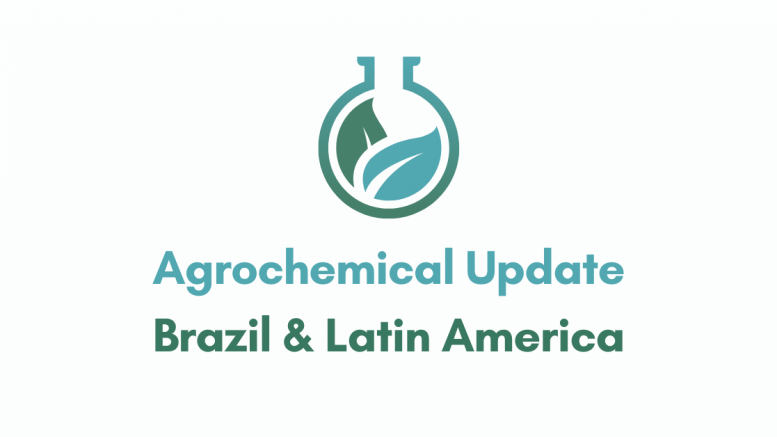Biological pesticide sector revenue reached US$ 570 million in 2022 in Brazil
Brazil
US$ 20.99 thousand is the necessary value for state registration of a pesticide in all states. “Some states charge very high fees, compounded by the toxicological classification of products. Others charge annual renewal fees and annual maintenance fees for the state registration of products. Some have renewals every two years, or every five years. So, it is necessary to know each state legislation,” said Luís Carlos Ribeiro, executive director of Aenda. (Luís Ribeiro, Aenda)
Adama, Cropchem and Sumitomo request the voluntary withdrawal of toxicological evaluation of atrazine, glyphosate, carbendazim, and esfenvalerate + clothianidin. (Anvisa)
Cropchem, Solus and Macroseeds went to court against Anvisa in order to speed up pesticide toxicological evaluation: bifenthrin (Macroseeds), chlorothalonil 720 g/L SC (Cropchem), and S-metolachlor 960 g/L EC (Solus) evaluations were approved. (Anvisa)
Herbicide and insecticide dealer was fined US$ 23.5 thousand for illegal storage of 11,000 liters of pesticides in Tacuru, State of Mato Grosso do Sul. Products were stored in drums without risk warnings on the labels, and in an unprotected area. (Environmental Military Police)
Biological pesticide sector revenue reached US$ 570 million in 2022. Sales of chemical pesticides reached US$ 15.37 billion, representing 96% of the market. (Cogo Inteligência em Agronegócio; Consultoria Kynetec)
Galvani announces investments of US$ 116.48 million in mining projects to produce
State of Paraná’s Government discusses partnerships with Canada to increase fertilizer imports. Acting Governor, Darci Piana, met with the Consul General of Canada in São Paulo, Heather Cameron, to discuss investments. “We are happy with the development of the partnership with the Government of Paraná in recent years and we want to intensify this relationship with the technological development for agriculture…”, said Cameron. (Government of Paraná State)
Orion and Koppert announce an agreement for the spraying of bioinputs directly in the sowing furrow of grain crops, through Orion’s spraying technology. Orion will lease equipments to Koppert’s customers to guarantee increase in yields, that can reach up to 6 bags/ha of soybean, according to the companies. Ricardo Cunha, CEO of Orion, said that the correct application of bioinputs in the sowing furrow can generate greater plant health, yields, and profits. (Orion; Koppert)
Rodrigo Egéa de Miranda is Plant Health Care’s new global marketing director. Flavio Enor Prezzi is the new managing director for South America. (Plant Health Care)
Incorrect pesticide packaging disposal may cause fines of at least US$ 954.13 in the State of Paraná. Offenders can be fined US$ 19.08 for each product found in violation. Penalties are provided for in ordinance published on 03/13, in the Official State Gazette. State has 12 centers and 58 stations for receiving pesticide packages. (Instituto Água e Terra)
Águia Fertilizantes intends to invest US$ 11.45 million to start work on an industrial site in the city of Lavras do Sul, State of Rio Grande do Sul. According to Fernando Tallarico, CEO of Águia Fertilizantes, earthworks
Rodrigo Oliveira is the new general manager of Stoller, and will report to Frederic Beudot, who leads Corteva’s biologics business. Guillermo de la Borda will be the new advisor to the General Manager of Corteva Biologicals Business, stepping down as CEO of Stoller. (Stoller; Corteva)

Latin America
Although chlorpyrifos sales and imports are canceled in Colombia, farmers can still use the inventory. Chlorpyrifos
According to the minister of regional production of Santa Fé, Daniel Costamagna, the Argentine province intends to close a cooperation agreement in the fertilizer sector with the OCP Group, from Morocco. “We are going to put all our energy and all the potential of our policy to encourage agro-industrial production in the province of Santa Fé, so that our relations with Morocco can develop…”, said Costamagna. (OCP Group; Government of Santa Fé)
In 2022, Nutrien hired more than 750 new employees in Argentina, doubling the company’s headcount. (Nutrien)
BASF invested US$2.69 million in its inoculant and biological products factory in Santo Tomé, Argentina, over three years. According to the company, investments increased the factory’s production capacity by 30%. (BASF)
Yara announced plans to invest US$ 100 million over a year and a half to increase production of NPK fertilizers in Colombia by 80 thousand tonnes and reduce carbon emissions equivalent to 500 thousand tonnes/year. “400,000 tonnes are manufactured here. Approximately 50,000 are exported. 40% of what is sold is imported and the rest is produced here”, said Pedro Parenti, Yara’s senior vice president for Latin America (Yara Fertilizantes)

READ MORE:

